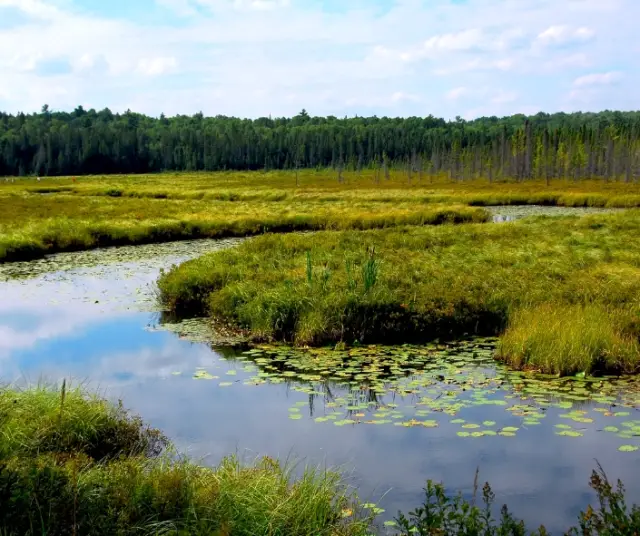Wetlands are vital ecosystems that provide a wide range of ecological, economic and social benefits. Every year, on February 2, World Wetlands Day is celebrated to raise awareness about the importance of these aquatic environments. This date commemorates the signing of the Convention on Wetlands, known as the " Ramsar Convention ", on February 2, 1971, in Ramsar, Iran. The objective of this international agreement is to promote the conservation and sustainable use of wetlands around the world.
Wetland Diversity
Wetlands come in various forms, from marshes and swamps to lagoons, river deltas and estuaries. The diversity of these environments is a reflection of the diversity of life they host. Wetlands are essential habitats for a wide variety of flora and fauna, including waterbirds, fish, amphibians, reptiles, mammals and aquatic plants. They are also vital for the migration of birds and other animals, providing strategic stops for feeding and resting during their long journeys.
Ecological Benefits of Wetlands
Natural Filtration
Wetlands are true natural filters. They act like sponges, absorbing and cleaning the water that flows through them. This is essential for maintaining water quality in rivers and lakes, as they retain nutrients and trap contaminants before they reach larger waters. Water purification is a vital ecosystem service that wetlands provide for free.
Wildlife Habitat
As we mentioned before, wetlands are home to a wide variety of species. These ecosystems provide shelter and food for many waterfowl, fish and other animals. Some species, such as alligators and crocodiles, are emblematic of tropical wetlands, while others, such as the beaver in temperate wetlands, play an important role in modifying their environment.
Flood Control
Wetlands also act as natural flood regulators. During heavy rains, they can store large amounts of water, reducing pressure on downstream rivers and reservoirs. They then gradually release this water, decreasing the risk of catastrophic flooding in urban and rural areas.
Carbon Capture
The accumulation of organic matter in wetlands leads to the capture of large amounts of carbon. This ecosystem service helps mitigate climate change by storing carbon from the atmosphere and preventing the release of greenhouse gases.
Economic Benefits of Wetlands
Wetlands are not only valuable from an ecological perspective, but they also play a crucial role in the global economy. Here are some of the key economic benefits they provide:
Fishing
Wetlands provide breeding, feeding and shelter habitats for numerous fish species. Wetland fishing is an important source of food and livelihood for millions of people around the world.
Agriculture
In many parts of the world, wetlands are fertile agricultural land. Rice fields, for example, are a fundamental component of agriculture in Asia and other regions. Additionally, wetlands often provide water for irrigation.
Tourism
Wetlands are popular tourist destinations due to their scenic beauty and rich wildlife. Ecotourism in these areas generates significant income for local communities, promoting sustainable economic development.
Recreation
Wetlands are also places where people enjoy recreational activities such as bird watching, kayaking, sport fishing, and hiking. These activities contribute to local tourism and the well-being of the population.
Social and Cultural Importance of Wetlands
Wetlands not only have an economic impact, but are also essential from a social and cultural perspective. Here are some ways wetlands influence people's lives:
Cultural heritage
Many communities have lived near wetlands for generations and have developed deep cultural ties to these environments. Wetlands often have symbolic and spiritual value in local traditions and myths.
Education
Wetlands offer unique opportunities for environmental education. They are natural laboratories that allow people to learn about biodiversity, hydrology and the importance of conservation.
Potable water supply
In some regions, wetlands are sources of drinking water for surrounding communities. The preservation of these ecosystems is essential to guarantee access to clean and safe water.
Threats to Wetlands
Despite their importance, wetlands face numerous threats today. These threats include:
Loss of habitat
Urbanization and intensive agriculture often lead to the degradation and destruction of wetlands. Conversion of land to other uses often reduces the area of available wetlands.
Pollution
Water pollution, whether through agricultural chemicals, industrial waste or municipal waste, can seriously damage the quality of wetlands. This affects both wildlife and the people who depend on them.
Climate change
Climate change has a negative impact on wetlands. The frequency of extreme weather events, such as droughts and floods, increases, which can significantly alter these ecosystems.
Invasive Species
The introduction of invasive species can compete with native species and disturb ecological balances in wetlands.
Overexploitation
Overexploitation of natural resources in wetlands, such as fishing and timber harvesting, can deplete these ecosystems and decrease their ability to provide benefits.
The Importance of Conservation
Wetland conservation is essential to protect biodiversity, maintain water quality and ensure a sustainable future for the communities that depend on these ecosystems. Here are some key strategies for its conservation:
Designation of Protected Areas
The creation of protected areas and the designation of Ramsar sites are crucial steps in safeguarding wetlands. These measures ensure that steps are taken to conserve and restore these unique environments.
Wetland Restoration
Restoring degraded wetlands can help restore the ecological and economic benefits they provide.
Education and Awareness
Public education and raising awareness about the importance of wetlands are essential to gaining support and commitment for their conservation.
Monitoring and Sustainable Management
Constant monitoring of wetlands and the implementation of sustainable management practices are essential to ensure their long-term survival.
International Collaboration
Cooperation between countries is crucial to address transboundary threats to wetlands and ensure their conservation globally.
World Wetlands Day is an opportunity to reflect on the importance of these vital ecosystems in our lives. Wetlands provide a multitude of ecological, economic, social and cultural benefits. However, they face significant threats that require concerted action for their conservation. The protection and restoration of wetlands is not only the responsibility of governments, but of the entire society. Together, we can ensure these unique and essential environments continue to thrive for future generations.
